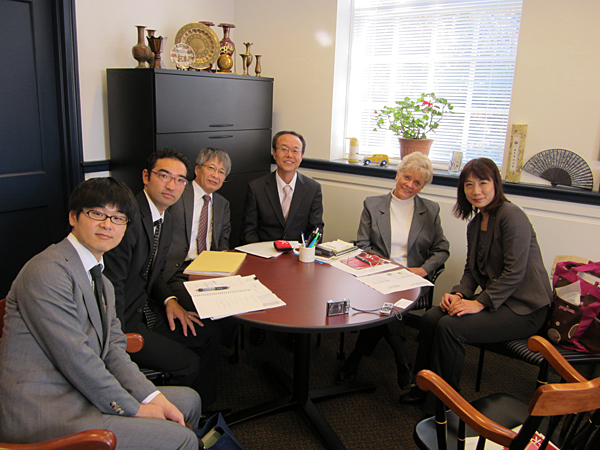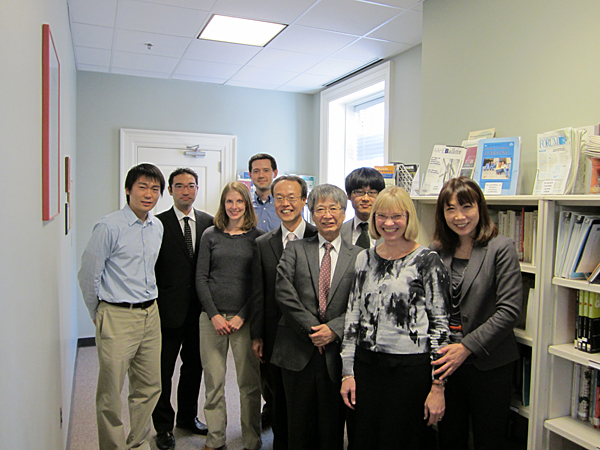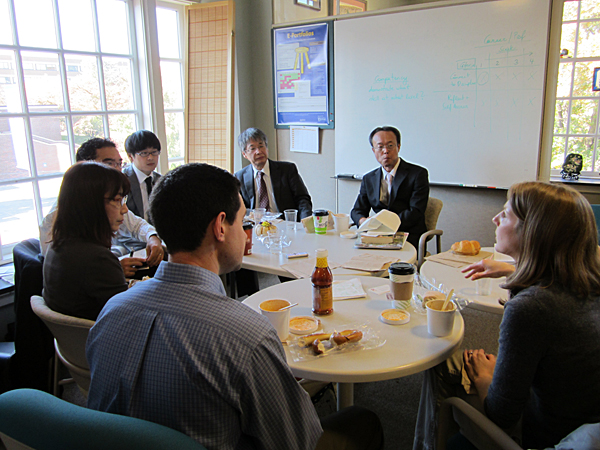


Preparing future faculty
Team from Japan explores UD's grad programs for preparing future faculty
3:30 p.m., Nov. 9, 2011--The Center for Teaching and Learning (CTL) at the University of Delaware recently hosted a team of five faculty members from Ritsumeikan University in Kyoto, Japan, who were interested in learning more about UD’s graduate professional development programs for preparing future faculty.
Ritsumeikan University is in the process of developing a Preparing Future Faculty (PFF) program for its graduate students. The faculty team, visiting UD on Nov. 2, wanted to find out how curricular aspects of the Higher Education Teaching Certificate (HETC) program at UD might apply to their institutional context. In addition to UD, the team also visited PFF programs at the University of Michigan and the University of Kentucky.
Global Stories
Fulbright awards
Peace Corps plans
The Japanese faculty visitors discussed program goals, curricula, organization and institutional support with Mary Martin, assistant provost in the Office of Graduate and Professional Education, and with Gabriele Bauer, CTL associate director and HETC program director. They also talked with current HETC Fellows about their career aspirations, motivation for program participation and learning experiences. The program was highlighted in the March issue of the Teaching, Learning and Assessment newsletter earlier this year.
“We greatly appreciate hearing from doctoral students about their experiences and perspectives, as any PFF program needs to be aware of and responsive to their needs and career aspirations as well as the economic context,” said Prof. Hirotaka Oki, deputy executive director of Ritsumeikan University’s Institute for Teaching and Learning, whose main area of research focuses on higher education and educational technology.
The discussion centered on graduate student career and instructional development and ways to build on existing workshops and offerings to design a coherent, comprehensive program. Questions explored competencies and skills that doctoral students need to obtain to be marketable in both academic and non-academic positions, such as grant writing, designing and teaching their own course, documenting teaching effectiveness, articulating achievements and future plans as teacher-scholars in the discipline, and translating theoretical research into applied, industry-based research.
Jennifer Codding, doctoral candidate in chemistry and biochemistry, stressed the importance of attending panel discussions and meetings with industry researchers, as they have informed her ability to align her research expertise with the research conducted in particular industries.
Differences in the roles and responsibilities of graduate teaching assistants (TAs) at universities in Japan and in the U.S. and their implications for developing a PFF program at Ritsumeikan University also were considered. For example, graduate TAs at Risumeikan assist faculty by preparing course materials and resources; they do not have any instructional interactions with the students.
“I enjoyed having the opportunity to share my experiences as an HETC Fellow to help inform the faculty members from Japan as they work to develop their own program to support graduate student professional development,” said Kerrin Wolf, doctoral student in public policy and administration.
The faculty visitors were curious about how participation in the program might be perceived by future academic employers and what materials doctoral students were putting together for their academic job search.
HETC Fellows shared examples of their academic ePortfolios (see video online) and explained how they have composed their portfolios and how they are using them in their job application process.
“I have included Google Analytics on my portfolio to find out which institutions are viewing my online materials, what sections of the portfolio they spend time on,” said Nicole Smolter, doctoral candidate in sociology and criminal justice. “It has been very encouraging to see that institutions that I have submitted faculty applications to have visited my portfolio and taken a closer look at my experiences.”
Kota Takahashi, a doctoral candidate in biomechanics and movement science, reflected: “The fact that faculty members from Japan would come all the way to the University of Delaware speaks volumes about the HETC program. I feel fortunate that the University offers such a professional development opportunity to its graduate students, and to be a part of such a unique program.”










